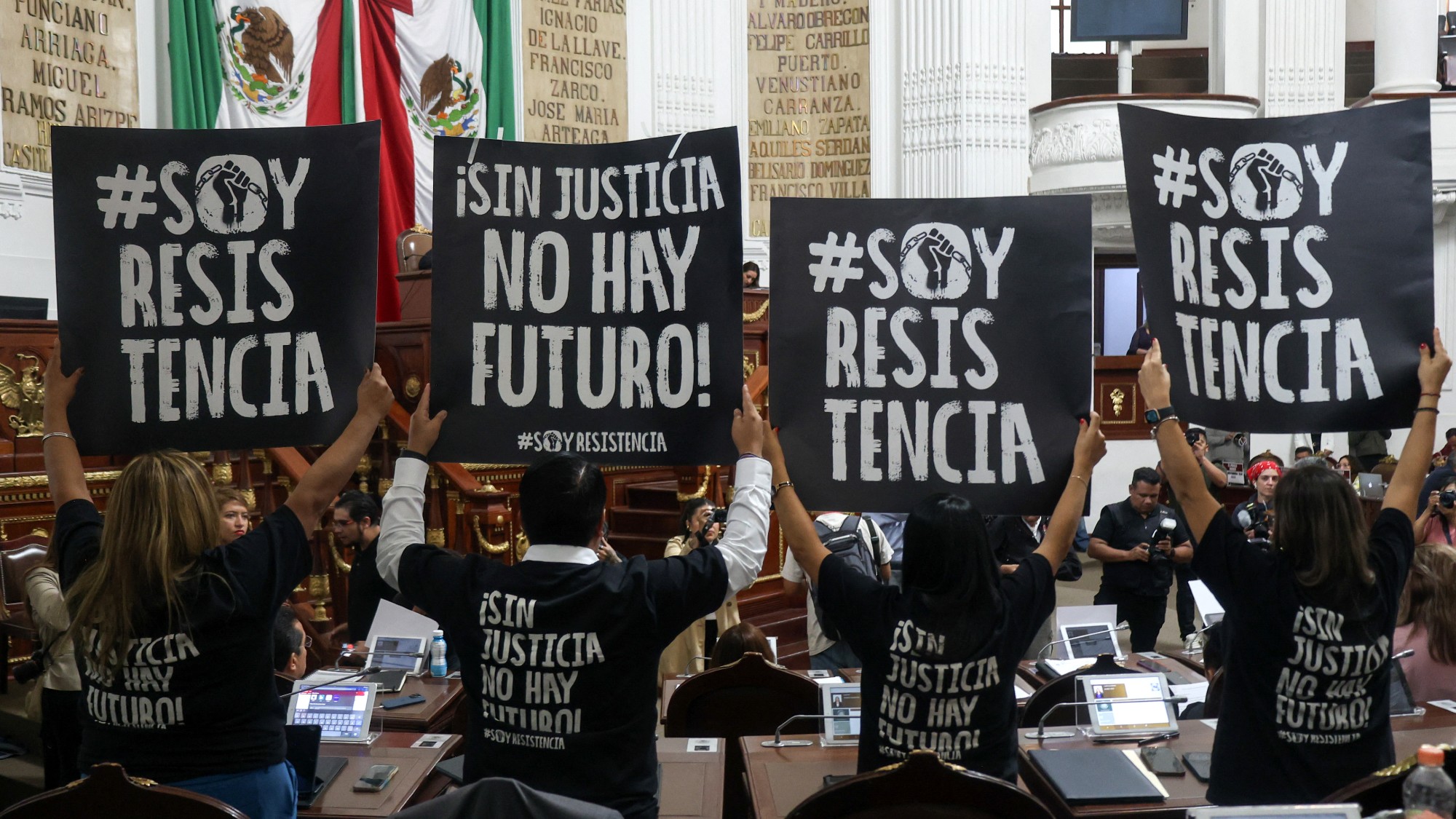Politicising the judiciary: Mexico's radical reform
Is controversial move towards elected judges an antidote to corruption in the courts or a 'coup d'état' for the ruling party?

A free daily email with the biggest news stories of the day – and the best features from TheWeek.com
You are now subscribed
Your newsletter sign-up was successful
Mexico has just lost its democracy, said Pablo Hiriart in El Financiero (Mexico City). In what must be a world first, it has decided that all of Mexico's 7,000 judges should be elected. It was all done constitutionally: thanks to the landslide victory of his Left-populist Morena party in the June elections, outgoing President Andrés Manuel López Obrador (a.k.a. AMLO) was able to secure the required two-thirds majority in the senate for this overhaul, though the senators had to hold the final vote in a different building to escape the rage of protesters who'd stormed into the chamber shouting, "The judiciary will not fall!"
Their rage was justified. AMLO has swept aside the objections of the opposition, legal scholars, and the US government, who all maintain that this authoritarian move will eliminate judicial independence and destroy the system of checks and balances our democracy depends on. This isn't the "will of the people". It's a "coup d'état" that puts all three branches of government in the hands of the ruling party.
The right-wing opposition is actually "attacking the democracy it claims to defend", said Juan Becerra Acosta in La Jornada (Mexico City). This overhaul is the only way to eliminate the corruption in our courts and confront a supreme court that has blocked AMLO's security and energy agenda. There's no denying our courts are run by a "clique of corrupt judges" who do the bidding of Mexico's rich, said Antonio Salgado Borge in Proceso (Mexico City). But to claim this reform will "cleanse the judicial system of corruption" is nonsense. Electing judges takes control of the judiciary out of the hands of the economic elites who've dominated Mexico for decades only to deliver it to the political elites in the Morena party. Still, at least we'll now "have a state capable of limiting the influence of big capital".
The Week
Escape your echo chamber. Get the facts behind the news, plus analysis from multiple perspectives.

Sign up for The Week's Free Newsletters
From our morning news briefing to a weekly Good News Newsletter, get the best of The Week delivered directly to your inbox.
From our morning news briefing to a weekly Good News Newsletter, get the best of The Week delivered directly to your inbox.
But it's not just the rich who'll suffer from this, the rest of us will suffer, too, said Marco A. Mares in El Economista (Mexico City). It will destroy confidence in our political and financial stability, we'll see a plummeting peso, less investment, and credit downgrades for the government and state oil company. And it will hurt trade relations with the US and Canada, just as we were poised to reap the benefits of deeper regional trade.
Choosing judges based not on their qualifications but on their political patrons is always a bad idea, said El Mundo (Madrid), but it's especially disturbing in a country "so penetrated by corruption and drug trafficking". Mexico may turn into a "dangerous bastion of instability in America's backyard"
A free daily email with the biggest news stories of the day – and the best features from TheWeek.com
-
 How to Get to Heaven from Belfast: a ‘highly entertaining ride’
How to Get to Heaven from Belfast: a ‘highly entertaining ride’The Week Recommends Mystery-comedy from the creator of Derry Girls should be ‘your new binge-watch’
-
 The 8 best TV shows of the 1960s
The 8 best TV shows of the 1960sThe standout shows of this decade take viewers from outer space to the Wild West
-
 Microdramas are booming
Microdramas are boomingUnder the radar Scroll to watch a whole movie
-
 Corruption: The spy sheikh and the president
Corruption: The spy sheikh and the presidentFeature Trump is at the center of another scandal
-
 Putin’s shadow war
Putin’s shadow warFeature The Kremlin is waging a campaign of sabotage and subversion against Ukraine’s allies in the West
-
 The fall of the generals: China’s military purge
The fall of the generals: China’s military purgeIn the Spotlight Xi Jinping’s extraordinary removal of senior general proves that no-one is safe from anti-corruption drive that has investigated millions
-
 Mexico’s vape ban has led to a cartel-controlled black market
Mexico’s vape ban has led to a cartel-controlled black marketUnder the Radar Cartels have expanded their power over the sale of illicit tobacco
-
 Syria’s Kurds: abandoned by their US ally
Syria’s Kurds: abandoned by their US allyTalking Point Ahmed al-Sharaa’s lightning offensive against Syrian Kurdistan belies his promise to respect the country’s ethnic minorities
-
 Iran unleashes carnage on its own people
Iran unleashes carnage on its own peopleFeature Demonstrations began in late December as an economic protest
-
 How oil tankers have been weaponised
How oil tankers have been weaponisedThe Explainer The seizure of a Russian tanker in the Atlantic last week has drawn attention to the country’s clandestine shipping network
-
 The rise of the spymaster: a ‘tectonic shift’ in Ukraine’s politics
The rise of the spymaster: a ‘tectonic shift’ in Ukraine’s politicsIn the Spotlight President Zelenskyy’s new chief of staff, former head of military intelligence Kyrylo Budanov, is widely viewed as a potential successor